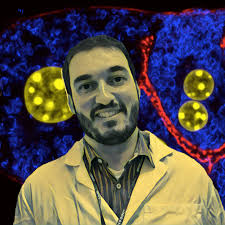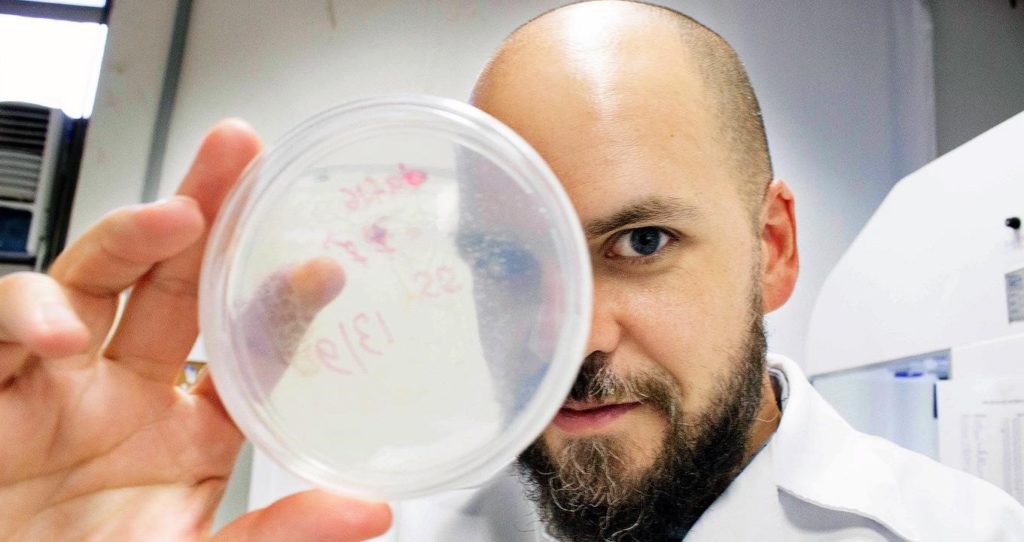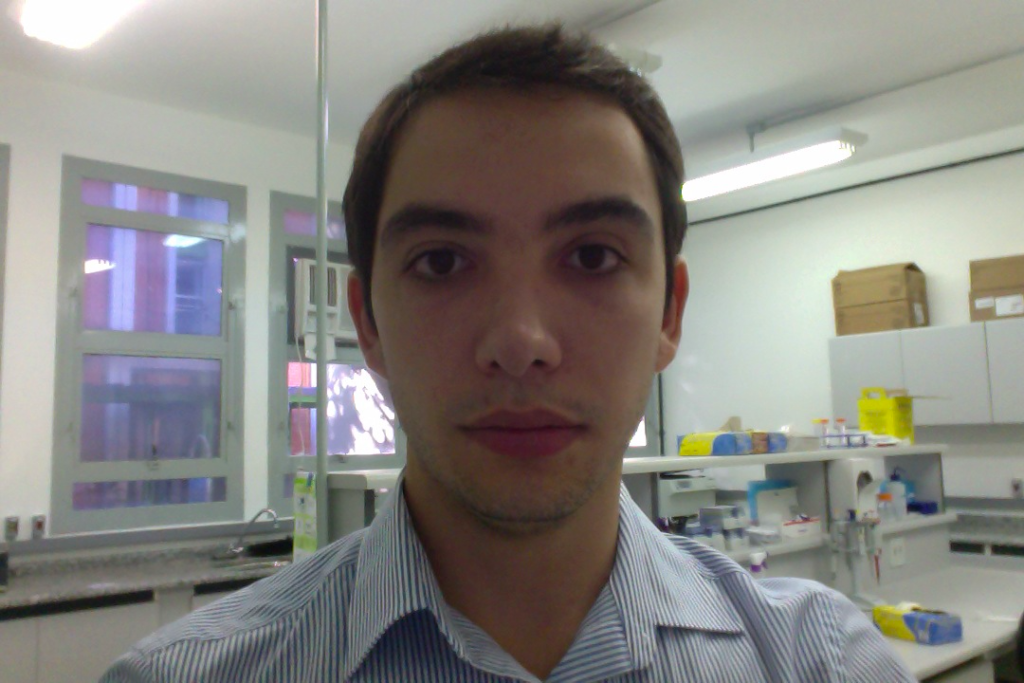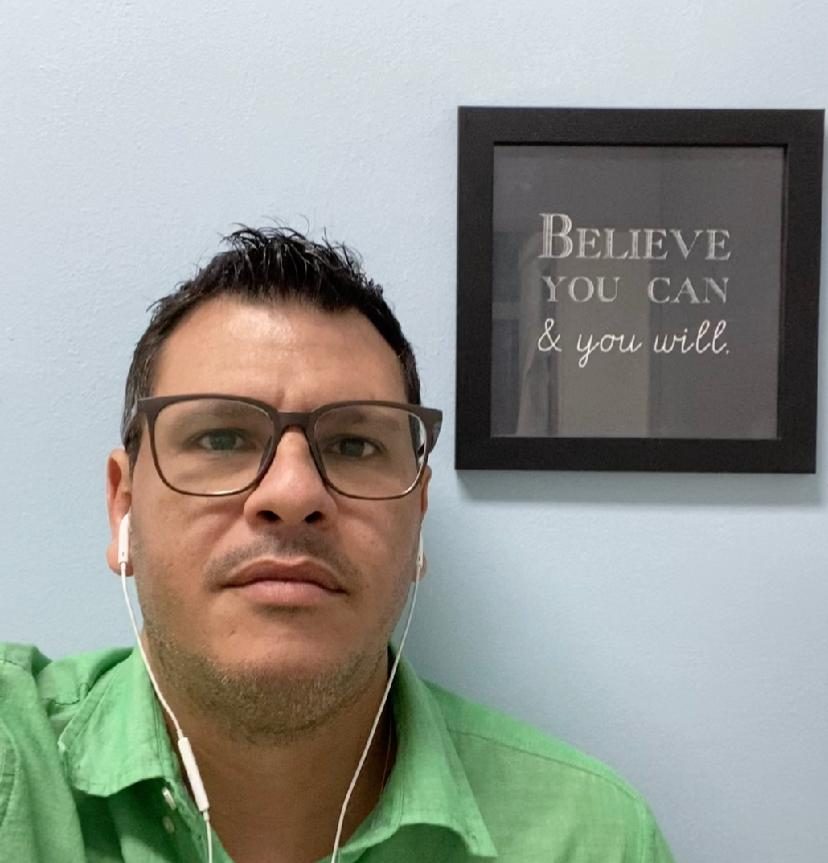people
PhD, Infectious Disease
andré damasio
Laboratory of Enzymology and Molecular Biology of Microorganisms (LEBIMO)
Department of Biochesmitry and Tissue Biology, University of Campinas
Telephone
55 (19) 35211437
adamasio@unicamp.br

Associate Professor at the Department of Biochemistry and Tissue Biology at the Institute of Biology - UNICAMP, where he founded the Laboratory of Enzymology and Molecular Biology of Microorganisms (LEBIMO). Bachelor degree in Industrial Pharmacy (2005), he obtained the Ph.D. in Biochemistry (2011) with an emphasis on Biochemistry of Microorganisms, at the Ribeirão Preto Medical School - USP. During the Ph.D. he joined the Department of Microbiology and Molecular Genetics at Oklahoma State University, OK, USA (2009), where he developed tools for the production of heterologous proteins in Aspergillus. Also, in 2010, he joined the Institute of Catalysis and Petrochemistry / CSIC, Madrid, Spain, where he applied immobilization and stabilization techniques to target enzymes. In 2011 he joined the Brazilian Biorenewables National Laboratory (LNBR), Campinas-SP, initially as a Postdoc fellow (2011-2013) and then as a Young Investigator - FAPESP Program (2013-2015). Research at LEBIMO is dedicated to genetics and biochemistry of filamentous fungi with 4 main focuses: 1) genetic manipulation of filamentous fungi strains for the production of enzymes for converting lignocellulosic biomass into biofuels and high-added value products; 2) how post-translational modifications (especially N-glycosylation) influence the production and function of enzymes; 3) the importance of some enzymes for the biology of model fungi through gene knockout and phenotyping; 4) evaluate the relationship between sirtuins and virulence, using Aspergillus fumigatus as a model. LEBIMO is a member of the São Paulo Fungal Group (SPFG) and the Experimental Medicine Research Cluster (EMRC).
PhD, Brain Disorders
Daniel
Martins-de-Souza
Laboratory of Neuroproteomics (LNP)
Department of Biochemistry and Tissue Biology, University of Campinas.
Telephone
55 (19) 3521-6129
dmsouza@unicamp.br

Associate Professor of Biochemistry at the University of Campinas (UNICAMP), Brazil. This is where Daniel obtained his BSc in Biology and his PhD in Biochemistry. The proteome of schizophrenia was the subject of his PhD thesis, which he continued to study during his postdoctoral training in the Max Planck Institute of Psychiatry, Germany and also in the University of Cambridge, UK. He headed the Neuroproteomics Unit of the Dept. of Psychiatry and Psychotherapy of the Ludwig Maximilians University (LMU) Munich, Germany before returning to Brazil in 2014. Back to UNICAMP, Daniel founded the Laboratory of Neuroproteomics funded by the São Paulo Research Foundation (FAPESP) via a Young Investigator Grant. Daniel´s lab employs proteomic tools to investigate molecular mechanisms involved in psychiatric disorders and the identification of potential biomarkers. He edited two scientific books, is currently Associated Editor for npj Schizophrenia (Nature) and founding member of the Brazilian Society of Proteomics and part of the board of the Brazilian Society of Mass Spectrometry. Daniel was elected Affiliated Member of the Brazilian Academy of Sciences (2017) and also for the São Paulo Academy of Sciences (2019) and is one of the Biology Coordinator at FAPESP.
PhD, Metabolism
Pedro M. M.
Moraes-vieira
Laboratory of Immunometabolism - LIM
Department of Genetics, Microbiology and Immunology,
University of Campinas
Telephone
55 (19) 35216121
pmvieira@unicamp.br

Associated Professor in Immunology at the University of Campinas. Bachelor degree in Veterinary Medicine by the University of Brasilia (2006). Master in Immunopathology by the Sao Paulo University School of Medicine and PhD in Immunology by the University of Sao Paulo participating in a graduate exchange program at the Transplantation Division of BIDMC/Harvard Medical School. Postdoctoral fellow at the Division of Metabolism, Endocrinology and Diabetes of the BIDMC/Harvard Medical School. We are interested in understanding how metabolism regulate and is regulated in both physiological and pathological conditions. The field of Immunometabolism is the new frontier for Immunology as it integrates the historically distinct disciplines of Metabolism and Immunology. The growing interest in Immunometabolism is fueled by the global obesity epidemic and the strong association between inflammation and metabolic disease. We use obesity and infections diseases as models to study how systemic metabolic alterations shape the immune system and have the goal to provide novel insights into new mechanisms and therapeutic targets underlying immunometabolic regulation and homeostasis.
PhD, Aging
Marcelo a. mori
Laboratório de Biologia do Envelhecimento (LaBE)
Department of Biochemistry and Tissue Biology, University of Campinas
Telephone
55 (19) 35216232
morima@unicamp.br

Bachelor degree in Biomedical Sciences by the Federal University of Sao Paulo (2002). Graduated in Molecular Biology by the Federal University of Sao Paulo (2007), participating also in a graduate exchange program at the Max-Delbrück Institute for Molecular Medicine (Berlin, Germany). Postdoctoral fellow at Joslin Diabetes Center/Harvard Medical School (Boston, USA). Assistant Professor at the Department of Biophysics of the Federal University of Sao Paulo from 2011 to 2016. Currently holds a position of Assistant Professor of Biology of Aging in the Department of Biochemistry and Tissue Biology, Institute of Biology, University of Campinas. Head of the Department of Biochemistry and Tissue Biology and Affiliated Member of the Brazilian Academy of Sciences. The main purpose of our lab is to identify and characterize molecular mechanisms involved in the aging process and in response to dietary interventions. We pay particular interest to understand how metabolism contributes to the genesis of age-related diseases like type 2 diabetes, cardiovascular diseases, and neurodegenerative diseases. We focus on the fat tissue - an important site of metabolic integration in multicellular organisms - and ask ourselves how this tissue responds to changes in energy balance and signals to other tissues to inform them about these changes. If not adjusted, this mechanism leads to several chronic diseases, especially in middle aged and elderly individuals. We identified that this control is at least in part exerted by changes in microRNA biogenesis in adipose tissue. When regulated, this process affects animal susceptibility to oxidative stress and influences lifespan.
PhD, Microbiota-host-interaction
Marco Aurélio
R. Vinolo
Laboratório de Immunoinflamação
Department of Genetics, Evolution, Microbiology and Immunology, University of Campinas
Telephone
55 (19) 35216270
mvinolo@unicamp.br

Bachelor degree in Pharmacy and Biochemistry by the University of Sao Paulo (2005). Graduated in Physiology by the University of Sao Paulo (2010). Postdoctoral fellow at the University of Sao Paulo (2010-2012). Assistant Professor (since 2012) at the Department of Genetics, Evolution, Microbiology and Immunology of Institute of Biology, University of Campinas. Affiliated Member of the Brazilian Academy of Sciences. The focus of my laboratory is to understand the molecular mechanisms by which microbiota-derived metabolites called short-chain fatty acids (SCFAs) interact with host cells and contribute to health. My laboratory is supported by Grants from international (BBSRC and Newton Fund) and national funding agencies (FAPESP and CNPq). As PI or co-Investigator on grants, I established a network of collaborators from several Research Institutes in Brazil, USA and UK, which led to multiple peer-reviewed publications and significant contributions which advanced the knowledge in the area of host-microbiota interactions.
PhD, Immune-Mediated Diseases
Alessandro S. Farias
Autoimmune Research Lab
Department of Genetics, Evolution, Microbiology and Immunology, University of Campinas
Telephone
55 (19) 35216714
asfarias@unicamp.br

